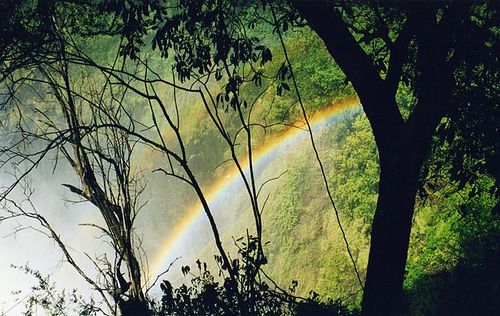(Environmental issues) |
|||
| Line 14: | Line 14: | ||
== News and comment == | == News and comment == | ||
'''2017''' | |||
Solar grid keeps harvests high, hospitals lit in parched rural Zimbabwe, Sep 11 <ref>[https://www.reuters.com/article/us-zimbabwe-solar-rural/solar-grid-keeps-harvests-high-hospitals-lit-in-parched-rural-zimbabwe-idUSKCN1BM1BQ Thomson Reuters Foundation]</ref> | |||
'''2015''' | '''2015''' | ||
Revision as of 15:29, 18 September 2017

Environmental issues
Large parts of Zimbabwe were once covered by forests with abundant wildlife. Deforestation and poaching has reduced the amount of wildlife. Woodland degradation and deforestation, due to population growth, urban expansion and lack of fuel, are major concerns and have led to erosion and land degradation which diminish the amount of fertile soil. Local farmers have also been criticised by environmentalists for burning off vegetation to heat their tobacco barns.
At the current rate of deforestation, Zimbabwe's natural woodland is expected to disappear by 2065. W
Initiatives by topic
Food activism
Solar cooking resources in Zimbabwe
News and comment
2017
Solar grid keeps harvests high, hospitals lit in parched rural Zimbabwe, Sep 11 [1]
2015
Zimbabweans Align With Climate-Smart Agriculture Amid Food Deficits, November 17 [2]
2010
Clean Up the World weekend 2010: The Scout Association of Zimbabwe, with a membership of 27,000 young Zimbabweans across the country, will embark on a campaign against veld fires. The campaign will engage recently resettled farmers and aims to raise awareness of the detrimental impact of wild fires on the environment. Just one of the many National Scout Organizations who have joined Clean Up the World as a result of the Ally relationship with the World Organization of the Scout Movement. [3] September 15
2009
2009 SEED Award Winners: "Bridge to the World". A small business, a research institution and an association of small-scale women farmers together are facing the challenge of improving rural livelihoods and reversing severe land degradation through innovative organic farming of essential oils, made from the indigenous Tarchonanthus camphoratus bush. [4] May 12
Interwiki links
Wikipedia: Zimbabwe, Environmental issues in Zimbabwe
References Template:Attrib sca ref